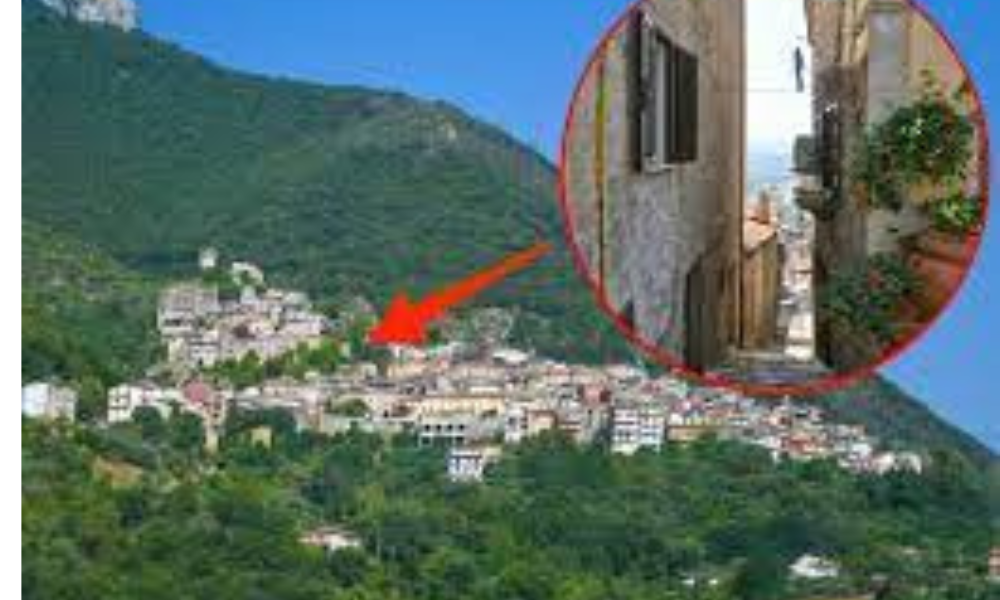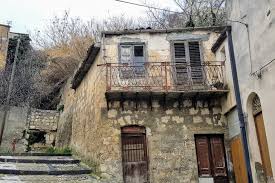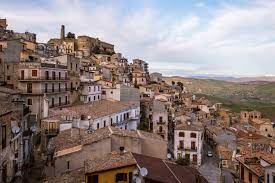Italiani nel Mondo
Ristrutturare una casa in Italia, un sogno che rischia di diventare un incubo — Restoring a house in Italy, a dream that risks becoming a nightmare

Ristrutturare una casa in Italia, un sogno che rischia di diventare un incubo
Questo articolo è indirizzato a coloro che intendono rientrare in Italia, comprando casa ispirati dalle offerte di Comuni in varie Regioni che danno ai residenti all’estero la possibilità di comprare casa in Italia per una cifra simbolica, perché la tendenza demografica nel corso dei decenni ha avuto l’effetto di lasciare molti paesi quasi vuoti con case non utilizzate ormai da molti anni. Ma questi acquisti hanno tutti una condizione essenziale, chi acquista deve pagare le spese per le ristrutturazioni della proprietà con un limite di tempo ben specifico e a volte altri limiti.
E questo articolo è anche indirizzato a coloro all’estero in cerca della loro “casa dei sogni” in Italia, senza capire che a volte imprese del genere potrebbero essere più complicate di quel che succede in altri paesi, a causa dell’enorme Patrimonio Culturale e storico d’Italia con proprietà che potrebbero essere soggette a vincoli molto specifici, per cui c’è anche la possibilità di penalità pesanti nel caso di lavori fatti senza l’autorizzazione delle autorità competenti, oppure anche per la demolizione di una proprietà per cercare di ridurre le spese, demolizioni che in certi casi sono proibite dalle stesse autorità.
Come ex costruttore edile in Australia prima di trasferirmi in Italia nel 2010, sono molto cosciente che ristrutturare proprietà, in particolare case, ville, palazzi, ecc. d’epoca, presenta sfide particolari per proprietari e costruttori e quindi capisco quanto sia difficile, se non impossibile, capire quel che si troverà nel corso dei lavori per cui l’eventuale acquirente di una casa antica in Italia deve essere ben consapevole che sarebbe utile mettere da parte una somma ragionevole per affrontare lavori del genere.
Nel corso degli anni recenti vari comuni in Italia hanno fatto campagne, anche internazionali, per attirare residenti all’estero a comprare proprietà per potersi trasferire permanentemente. Di solito il costo di queste proprietà è una cifra simbolica, in alcuni casi persino di 1 Euro, ma anche di poche migliaia di Euro che rendono le offerte allettanti per molti all’estero.

Però, chi desidera accettare queste offerte deve capire che non sono regali dei Comuni, ma hanno tutti una serie di condizioni che saranno soggetto di un contratto legale con eventuali penalità.
Ovviamente il futuro residente di questi paesi dovrà trasferirsi nel luogo, spesso ancora prima di iniziare i lavori, che già di per se potrebbe aggiungere costi alla decisione.
Naturalmente i lavori hanno un limite del tempo entro i quali dovranno essere terminati, e nel caso di paesi antichi potrebbero avere condizioni che non permetteranno cambi delle facciate per non rovinare l’aspetto urbano del paese.
E visto che si tratta di proprietà non abitate da tanto tempo, il possibile acquirente dovrebbe controllare queste condizioni e, molto più importante, assicurarsi delle stato del palazzo. Quindi, sarebbe utile visitare il luogo, magari consultarsi non solo con le autorità locali, ma anche con i costruttori, falegnami, ecc. locali, per vedere i costi, e soprattutto i tempi del lavoro, per accertare che il limite del tempo sia congruo per i lavori da fare.
Ma il futuro acquirente deve anche assicurarsi che il paese sia adatto per la vita che desidera fare una volta trasferitosi in Italia. Allora, deve controllare che ci siano i servizi necessari come medici, cliniche, ecc. per gli inevitabili problemi di salute e così via. Senza dimenticare che bisogna controllare quanto il paese sia isolato da altre parti del territorio circostante.
Per dare un esempio non indifferente, il futuro acquirente con problemi di salute deve assicurarsi che il luogo abbia accesso facile ad ospedali e cliniche per le cure, e che nel caso di emergenza le attese per ambulanze e assistenza non siano troppo lunghe.
Quindi il nostro consiglio a chi stia considerando di fare un passo del genere è di controllare bene l’offerta e, prima di firmare il contratto, di assicurarsi degli eventuali costi per i lavori e che abbia i mezzi per possibili imprevisti dovuti allo stato della proprietà perché, come ho scoperto da esperienze dirette nel corso del mio lavoro nel campo edile, non sempre lo stato è ovvio e spesso i problemi nascono quando si comincia a fare i lavori che riveleranno debolezze strutturali, ecc., non sempre evidenti ad un occhio inesperto.

Inoltre, chi desidera fare lavori di ristrutturazioni di case antiche in Italia deve essere cosciente che c’è una categoria che pone limiti su come i lavori devono essere eseguiti.
Come sappiamo, tutto il paese ha palazzi antichi ed è logico che questi siano d’interesse nazionale e questo interesse non è un fatto banale perché nei casi di proprietà considerate di valore artistico e culturale, la proprietà è soggetta ai controlli ed i permessi della Sovrintendenza dei Beni Culturali, spesso chiamata le Belle Arti.
Il primo effetto inizia già dall’acquisto della proprietà che è soggetto all’approvazione delle Bella Arti, ma i veri vincoli di queste situazioni arrivano con le ristrutturazioni.
In linea generale il proprietario deve assicurare di non cambiare gli aspetti culturali/artistici della villa, palazzo, ecc. Questo si riferisce non solo agli aspetti esterni, ma anche all’interno con affreschi, decorazioni particolari, e tutti i dettagli che rendono la proprietà soggetta all’interesse delle Belle Arti.
Questi vincoli comprendono anche il preavvisare le autorità di futuri lavori sulla proprietà presentando il progetto per l’approvazione prima di iniziare i lavori. Questi lavori devono essere eseguiti secondo legge e con i controlli delle autorità.
Inoltre, in molti casi la proprietà non può essere demolita e se il proprietario dovesse agire senza il consenso sarà soggetto non solo a pagare le spese di un eventuale ripristino del palazzo, ma anche a pagare penalità pesanti ed il costo del danno culturale/artistico recato dai lavori illeciti.
Per questi motivi i residenti all’estero che desiderano comprare case in Italia devono rendersi conto e capire le loro responsabilità, non solo morali verso la Cultura del paese ma anche verso le leggi che proteggono questa Cultura che appartiene non solo all’Italia, ma anche a tutto il mondo, perché l’Italia ha un Patrimonio Culturale enorme che deve essere protetto in ogni modo possibile, partendo anche da chi vuole rovinare palazzi di ogni genere che hanno visto la storia d’Italia nel corso degli anni.
Quindi, consigliamo ai nostri lettori che intendono fare questi passi nel futuro di assicurarsi non solo che potranno permettersi di rispettare l’eventuale contratto di acquisto, e non solo le offerte dei comuni per case comprate con un prezzo simbolico, ma anche capire che palazzi che sembrano di poco valore potrebbero essere soggetti alle Belle Arti perché hanno svolto un ruolo importante nel passato del paese o la città.
Così questi futuri residenti vedranno il sogno di una casa bella in Italia realizzarsi invece di vederlo diventare un incubo per non aver controllato per bene le proprie responsabilità prima di firmare il contratto…
Restoring a house in Italy, a dream that risks becoming a nightmare
In order to avoid misunderstandings I want to specify that this article is directed at those who intend retiring in Italy by buying a house inspired by the offers of local councils in a number of regions that give residents overseas the chance to buy a house in Italy for a nominal sum because the demographic trend in the country over recent decades has had the effect of leaving many towns almost empty with houses unused for many years. But these purchases all have a fundamental condition, that they must pay the costs of restoration of the properties within a very specific time limit and at times others limitations.
And this article is also directed at those people overseas who are looking for their “dream home” in Italy, without understanding that sometimes such matters can be more complicated than what happens in other countries due to Italy’s enormous Cultural and historical heritage which means that some properties could be subject to many specific constraints for which there may be heavy penalties in the case of work carried out without the authorization of the competent authorities as well as for the demolition of a property to try and reduce the costs because in certain cases these demolitions are prohibited by the same authorities.
As a former builder in Australia before moving to Italy in 2010 I am very aware that restoring properties, particularly old homes, villas, etc has particular challenges for owners and builders and therefore I understand how hard, if not impossible, it is to understand what will be found during work, so that any buyer of an old house in Italy must be well aware that it would be useful to set aside a reasonable amount to undertake with such work.
In recent years various local councils in Italy have made campaigns, even international, to attract residents overseas to buy properties to order to move there permanently. Usually the cost of these properties is a nominal amount, in some cases even 1 Euro, but also a relatively few thousand Euros which make the offers tempting for many people overseas.

However, those who wish to accept these offers must understand that they are not gifts from the local councils but they all have a series of conditions that will be subject to a legal contract with possible penalties.
Obviously the future residents of these towns must move to the place, often even before starting work which on its own could already add costs to the decision.
Of course the work has a time limit within which it must be completed and in the case of old towns there could also conditions that do not allow changes to the façades in order not to ruin the urban look of the town.
And seeing that we are talking about properties that have been uninhabited for a long time, the possible purchaser should check these conditions and, even more importantly, ensure the state of the building. Therefore, it would be useful to visit the place, maybe consulting not only with the local authorities but also local builders, carpenters, etc, to see the costs and above all the times for the work to ascertain that the time limit is right for the work to be done.
And the future buyer must also ensure that the town is right for the life he or she wishes to have once he or she has moved to Italy. So, he or she must check that there are the necessary services such as doctors, clinics, etc for any health problems and so forth. Without forgetting that he or she must check how isolated the town is from other parts of the territory.
To give a not indifferent example, the future buyer with health problems must ensure that the place has easy access to hospitals and clinics for treatment and that, in the case of emergencies, the waiting time for ambulances and assistance is not too long.
Therefore, we advise those who are considering taking such a step to check the offers well and before signing to contract to ensure the eventual costs of the work and that he or she also has the means for possible unforeseen developments due to the state of the property because, as I discovered from direct experience during my work in the building field, the state is not always obvious and often problems arise when you begin the work that will reveal structural weaknesses, etc. that are not always evident to the naked eye.

Furthermore, those who wish to carry out restorations in old homes must be aware that there is a category that sets limits on how the work must be carried out.
As we know, all the country has old buildings and it is logical that these are of national interest and this interest is not at all trivial because, in the case of properties considered to have a certain artistic and cultural interest, this means that the buyer must understand that the property is subject to the checks and permits of the Sovrintendenza dei Beni Culturali (Superintendence of Cultural Heritage), often called the Belle Arti (Fine Arts).
The first effect begins as soon as the purchase of the property because it is subject to the approval of the Belle Arti but the real constraints of these situations come with the restorations.
Generally, the owner must ensure that he or she will not change the cultural/artistic aspects of the villa, palazzo, etc. This refers not only to the external aspects but also the interiors with frescoes, particular decorations and all the details that make the property subject to the interest of the Belle Arti.
These constraints also include advance warning to the authorities of future work to the property and presenting the plans for approval before starting the work. This work must be carried out according to the provisions of the law and with the controls of the authorities.
Furthermore, in many cases the property cannot be demolished and if the owner should act without consent he or she will be subject not only to paying the costs of any restoration to the building but also to pay heavy penalties and the cost of the cultural/artistic damage caused by the illicit work.
For these reasons residents overseas who wish to buy a house in Italy must realize and understand their responsibilities, not only moral, towards the country’s Culture but also to the laws that protect this Culture that belongs not just to Italy but also to the whole world that must be protected in every way possible, also starting with those who want to ruin buildings of every type that witnessed Italy’s history over the years.
Therefore, we advise our readers who intend taking these steps in the future to ensure not only that they can afford to comply with the purchase contract, and not only the offers of local councils for houses bought with a nominal price, but also to understand that even buildings that seem to have little value could be subject to the Belle Arti because they played an important role in the past of the town or city.
In this way these future residents will see their dream of a beautiful home in Italy come true, instead of seeing it become a nightmare for not having checked their responsibilities well before signing the contract…













